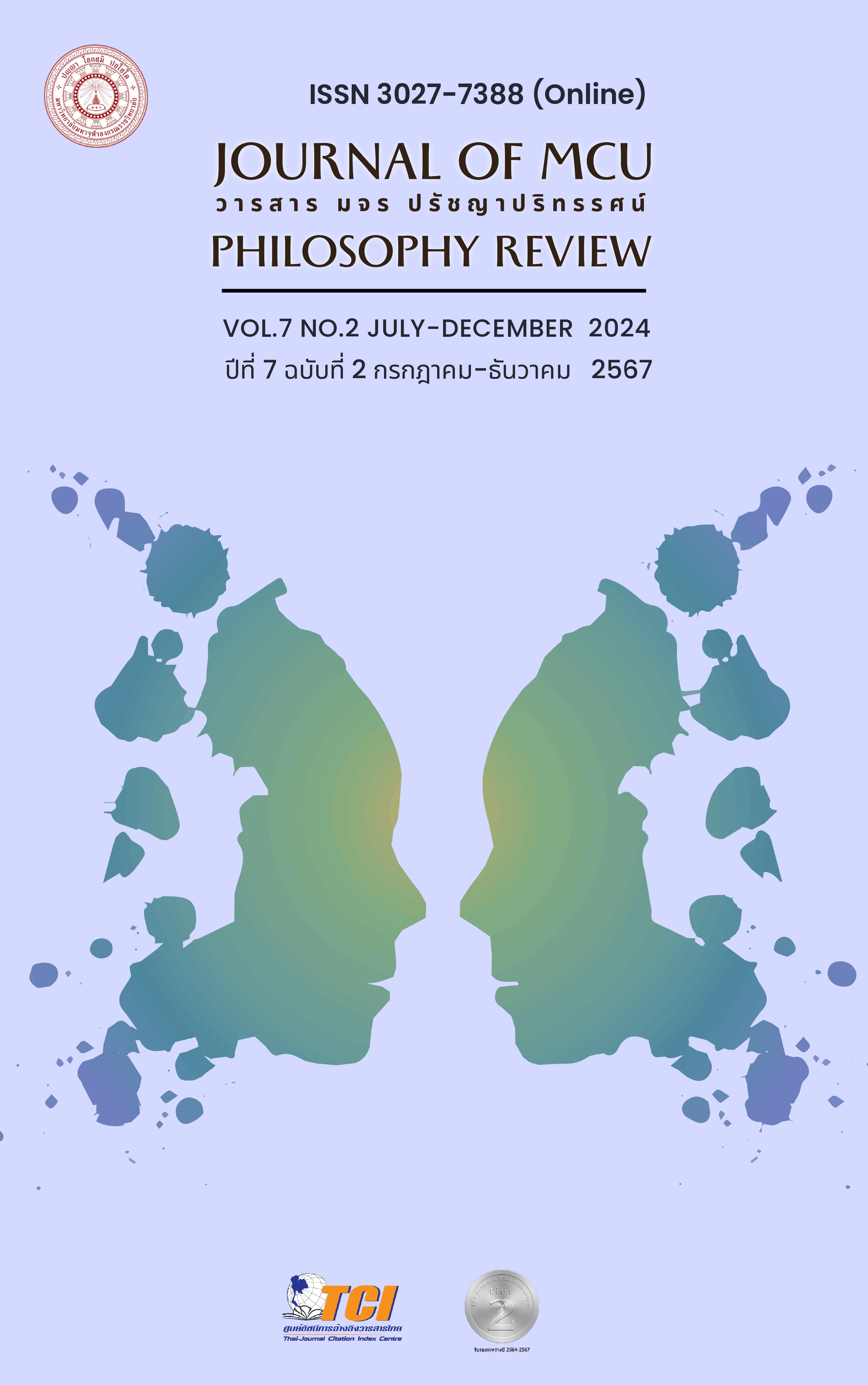Participative Managemet of Small Sized School in Burapa Suksa School Group Nakonpathom Primary Educational Service Area Office 1
Main Article Content
Abstract
The purposes of this research were to determine 1) the participative management of small sized school in Burapa Suksa group and 2) the guidelines for developing participative management of small sized school in Burapa Suksa group. The population consisted of 35 teachers of small sized school in Burapa Suksa group Nakhonpathom Primary Educational Service Area Office 1. The research tools used were a questionnaire and structured interview form. The statistics used in the reserch were frequency, percentage, arithmetic mean. Standard deviation, and content analysis. The research findings were found as follows: 1. Participative management of small sized school in Burapa Suksa group Nakhonpathom Primary Educational Service Area Office 1 is overall at a high level. When considering each aspect, it was found that it is at a high level in every aspect. By sorting the arithmetic mean values from highest to lowest as follows: commitment, trusting each other, independence in work, and setting goals and objectives together, respectively. 2. Guidelines for developing participative management of small sized school in Burapa Suksa group Nakhonpathom Primary Educational Service Area Office 1, all 4 areas are as follows: 1) Trusting: the school director should accept and trust in the knowledge and abilities of co-workers, trust to assign important work to co-workers. 2) Commitment: support clear teamwork to make co-workers bond. 3) Goals and objectives: pprovide opportunities for all co-workers to participate in setting goals the organization's plans together by using a teamwork process to evaluate and develop results to improve the work. 4) Autonomy: provide opportunities for participants to showcase their own talents, give freedom to work and make decisions in order to carry out various activities of the organization efficiently.
Article Details

This work is licensed under a Creative Commons Attribution-NonCommercial-NoDerivatives 4.0 International License.
บทความที่ได้รับการตีพิมพ์เป็นลิขสิทธิ์ของวารสาร มจร ปรัชญาปริทรรศน์
ข้อความในบทความที่ได้รับการตีพิมพ์ในวารสาร ถือเป็นความรับผิดชอบของผู้เขียนบทความ และข้อคิดเห็นนั้นไม่ถือว่าเป็นทัศนะและความรับผิดชอบของกองบรรณาธิการวารสาร มจร ปรัชญาปริทรรศน์
References
แก้วภัทรา จิตรอักษร. (2565).“ความสัมพันธ์ระหว่างคุณลักษณะผู้นำกับการบริหารแบบมีส่วนร่วมของผู้บริหารสถานศึกษาสังกัดสำนักงานเขตพื้นที่การศึกษาประถมศึกษาราชบุรี เขต 1”. วารสารสิรินธรปริทรรศน์, 23(9), 249-261.
ธีรภัทร โคตรบรรเทา. (2563). “ได้ศึกษาเรื่องการพัฒนาแนวทางการบริหารสถานศึกษาแบบมีส่วนร่วมของโรงเรียนกลุ่มเครือข่ายพัฒนาคุณภาพการศึกษา กลุ่มที่ 2 สังกัดสำนักงานเขตพื้นที่การศึกษาประถมศึกษาขอนแก่น เขต 1”. วารสารวิชาการและวิจัย มหาวิทยาลัยภาคตะวันออกเฉียงเหนือ, 10(3), 156-157.
ธีรศักดิ์ อุปรมัย อุปไมยอธิชัย และสุชาติ บางวิเศษ. (2561). การบริหารและการจัดการศึกษาสู่การพัฒนาที่ยั่งยืน. กรุงเทพฯ: สำนักพิมพ์มหาวิทยาลัยนเรศวร.
นิษฐ์วดี จิรโรจน์ภิญโญ. (2560). “ความสัมพันธ์ระหว่างการบริหารแบบมีส่วนร่วมกับธรรมาภิบาลของผู้บริหารในสถานศึกษาสังกัดสำนักงานเขตพื้นที่การศึกษาประถมศึกษาราชบุรี เขต 2”. วารสารมหาวิทยาลัยนครพนม, 7(2), 19-21.
พัชรีพร พรหมกิ่งแก้ว. (2565). “แนวทางการพัฒนาการบริหารแบบมีส่วนร่วมของโรงเรียนเทศบาลเวียงพางคำ อำเภอแม่สาย จังหวัดเชียงราย”. วารสารครุศาสตร์วิชาการ มหาวิทยาลัยราชภัฏเชียงราย, 7(1), 203-205.
สำนักงานเลขาธิการสภาการศึกษา. (2560). แผนการศึกษาแห่งชาติ พ.ศ. 2560–2579. กรุงเทพฯ: สำนักพิมพ์พริกหวาน กราฟฟิค.
อมรภัค ปิ่นกำลัง. (2562). “การบริหารแบบมีส่วนร่วมของโรงเรียนเรียนรวมสังกัดสำนักงานเขตพื้นที่การศึกษาประถมศึกษาสมุทรสงคราม”. (วิทยานิพนธ์ปริญญาศึกษาศาสตรมหาบัณฑิตสาขาวิชาการบริหารการศึกษา). ภาควิชาการบริหารการศึกษา มหาวิทยาลัยศิลปากร.
ณัฐนนท์ วิทยาประโคน. (2566). “แนวทางการบริหารแบบมีส่วนร่วมเพื่อเพิ่มผลสัมฤทธิ์ด้านสมรรถนะผู้เรียน สังกัดสำนักงานเขตพื้นที่การศึกษาประถมศึกษาบุรีรัมย์ เขต 2”. วารสารมนุษยศาสตร์และสังคมศาสตร์ มหาวิทยาลัยมหาสารคาม, 42(1), 109-110.
วิศรุต เพ็ชรสีม่วง. (2564).“การบริหารแบบมีส่วนร่วมผู้บริหารสถานศึกษา สำนักงานเขตพื้นที่การศึกษาประถมศึกษาชัยภูมิ เขต 2”. วิชาการและวิจัย มหาวิทยาลัยภาคตะวันออกเฉียงเหนือ, 11(3), 124-125.
แก้วภัทรา จิตรอักษร. (2565). “ความสัมพันธ์ระหว่างคุณลักษณะผู้นำกับการบริหารแบบมีส่วนร่วมของผู้บริหารสถานศึกษาสังกัดสำนักงานเขตพื้นที่การศึกษาประถมศึกษาราชบุรี เขต 1”. วารสารสิรินธรปริทรรศน์, 23(9), 249-261.
A.B. Buthelezi and B.T. Gamede. (2019). “Challenges facing secondary school principals regarding effective implementation of participative management in patriarchal South Africa”. Sabinet African Journals, 17(4), 132-133.
Best ,John w., and V. Kahn James. (2006). Research in Education. 10th ed. Boston, Mass: Allyn and Bacon.
Rensis Likert. (1967). The Human Organization. New York, NY: McGraw- Hill.


